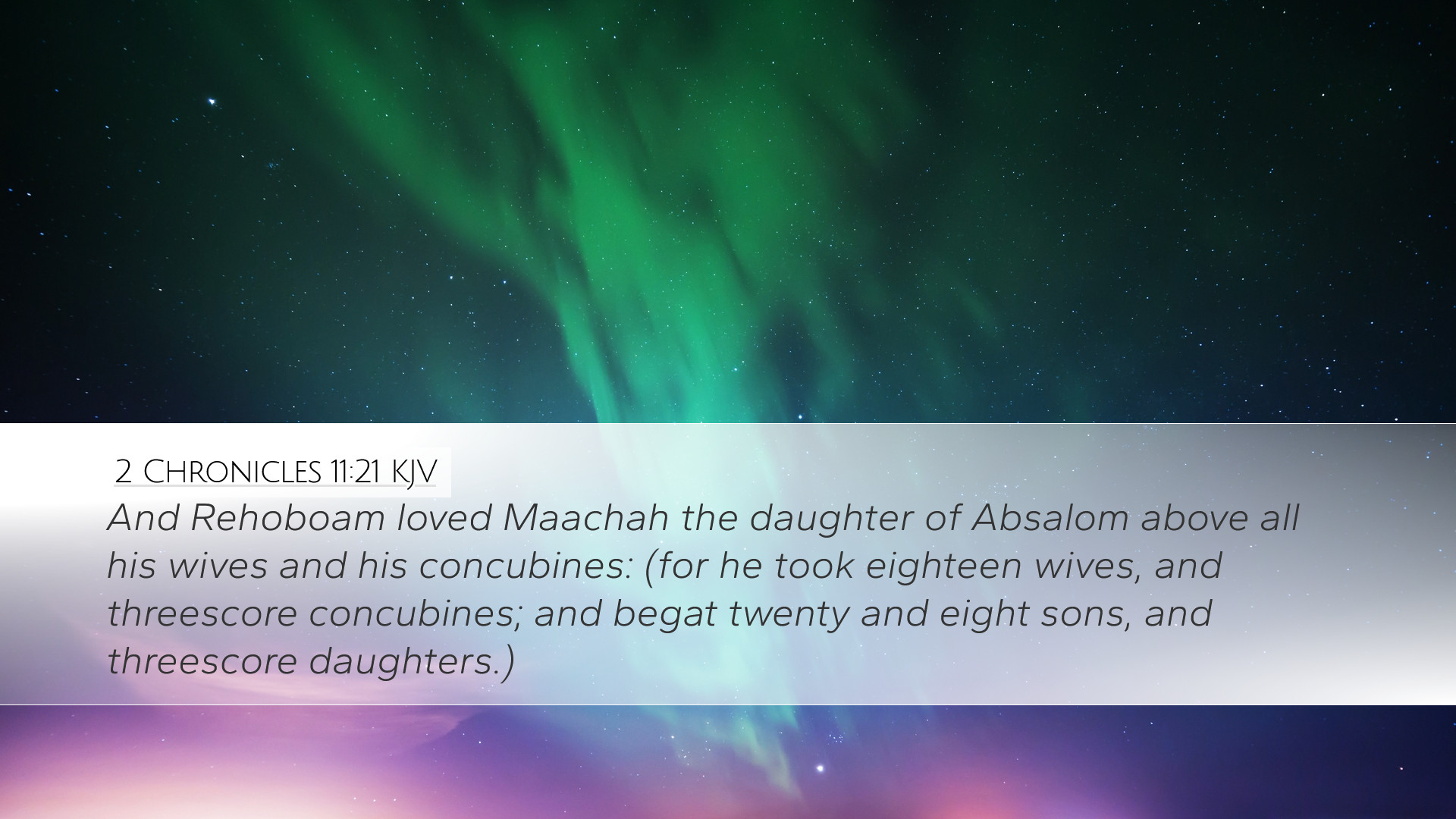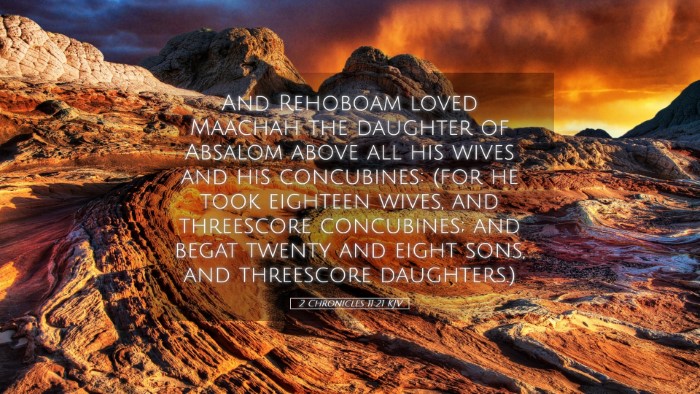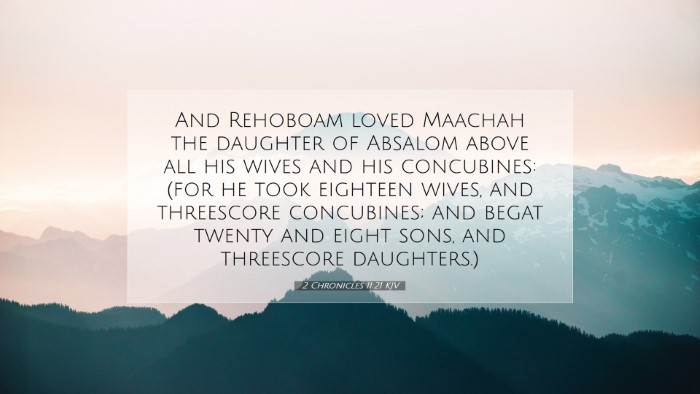Commentary on 2 Chronicles 11:21
The verse 2 Chronicles 11:21 reads: "And Rehoboam loved Maachah the daughter of Absalom above all his wives and his concubines: (for he took eighteen wives and threescore concubines; and begat twenty and eight sons, and threescore daughters.)" This passage provides a fascinating glimpse into the family dynamics of Rehoboam, highlighting the interplay of love, politics, and kingship in ancient Israel.
Insights from Public Domain Commentaries
Matthew Henry's Commentary
Matthew Henry observes that Rehoboam’s preference for Maachah reflects both personal affection and political expediency. Maachah, being the daughter of Absalom, links Rehoboam to one of the most tumultuous and challenging figures in Israel's history. This relationship illustrates the complex nature of royal marriages during that time period, whereby alliances were frequently formed or complicated through matrimonial ties.
Henry emphasizes the potential implications of Rehoboam's choice: "The love of Maachah might have been more political than true affection, as he navigated his reign amid factions and aspirations." This highlights the significant burden on Rehoboam to secure his throne and manage internal divisions in Israel, particularly following the division of the kingdom.
Albert Barnes' Notes on the Bible
Albert Barnes offers a detailed insight into the numerical aspects of Rehoboam’s family, noting that he had "eighteen wives and threescore concubines." Barnes suggests that the sheer volume of Rehoboam's wives and concubines illustrates the grandeur associated with monarchs in that era, but it also serves to emphasize potential spiritual pitfalls.
Barnes indicates that Solomon’s legacy of numerous foreign wives and their influence on his heart may have echoed in Rehoboam’s choices. This foreshadowing suggests that the pattern of idolatry and the shifting of allegiances begun during Solomon’s reign could continue under Rehoboam’s leadership. The potential for leading a nation into error through immoral alliances poses a crucial warning for both leaders and followers today.
Adam Clarke's Commentary
Adam Clarke provides a thorough examination of the underlying Hebrew text, focusing on the significance of the names and relationships mentioned. Maachah’s identity as the daughter of Absalom is particularly significant. Clarke points out that despite Absalom’s tragic end and the rebellion he incited, Maachah’s lineage gave her a certain prestige and perceived legitimacy in the royal court.
Clarke also underscores the cultural context, stating: "The position of a king necessitated not just love but also strategic alliances, making decisions rooted in affection complex." This prompts a reflection on how kingship often demands sacrifices in personal relationships for the greater good of the state, a dilemma faced by many leaders throughout history.
Theological Implications
The interplay of love and duty depicted in Rehoboam's relationships opens a window into the theological implications regarding the nature of leadership. As pastors and theologians reflect on this passage, it is essential to consider how the biblical model of leadership contrasts with contemporary perspectives.
- Divine Sovereignty versus Human Choice: Rehoboam’s decisions were undoubtedly influenced by his status and the surrounding culture. However, they also reflect a broader theological truth that God's sovereignty is often worked through human choices, including those that appear flawed or driven by personal interests.
- The Role of Family in Leadership: Rehoboam's preference for Maachah over his other wives suggests the place of personal relationships in the life of a leader. This relationship, while certainly a source of affection, also serves larger implications for his rule and the spiritual health of the nation.
- Warning Against Idolatry: The influx of wives and concubines brings the persistent theme of idolatry and misalignment with God’s commands, suggesting that leaders must remain vigilant against the influences of worldly attachments that lead away from scripture.
Practical Applications for Leaders
For those in leadership roles within the church and broader community, 2 Chronicles 11:21 serves as a timely reminder of the intersection of personal affection and professional responsibility. The weight of decisions made in care for family should reflect God’s design and holiness, ensuring that the pursuits of love do not compromise the mission of integrity and righteousness.
- Evaluate Relationships: Leaders are compelled to assess their personal relationships regularly, discerning whether they are aligning with or detracting from their responsibilities before God and their community.
- Encourage Accountable Friendships: Like Rehoboam, who likely faced many opinions, cultivating a circle of wise counsel is crucial. Leaders should seek those who will encourage spiritual growth and challenge unwise alliances.
- Commit to Faithfulness: Above all, the call is to remain faithful to God’s word and commands. Rehoboam’s story stands as a potent reminder that our greatest strength as leaders arises from unwavering fidelity to God's truths.
Conclusion
In summary, 2 Chronicles 11:21 serves not only as a historical account but as a rich source of reflections for today's leaders. By drawing upon the insights of Matthew Henry, Albert Barnes, and Adam Clarke, contemporary pastors, students, and scholars can uncover relevant lessons for their own lives and ministries.


